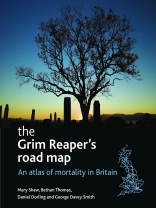This impressive full-colour atlas, with over 100 colour-coded and accessible maps, uniquely presents the geography of death in Britain. The first atlas published on this subject for over two decades, this book presents data from more than 14 million deaths over a 24-year period in Britain. The maps detail over 100 separate categories of cause of death, including various cancers, suicides, assault by firearms, multiple sclerosis, pneumonia, hypothermia, falls, and Parkinson’s disease, and show how often these occurred in different neighbourhoods. Accompanying each map is a detailed description and brief geographical analysis – the number of people who have died due to each cause, the average age of death and ratio of male to female deaths are listed. Taken as a whole, these provide a comprehensive overview of the geographical pattern of mortality in Britain. This atlas will be essential reading for academics and students of social medicine, sociology of health and illness and epidemiology. It will also be valuable for anyone who wants a better understanding of patterns of mortality within Britain, including medical and healthcare practitioners, policy makers and researchers.
O autorze
Mary Shaw is Reader in Medical Sociology in the Department of Social Medicine at the University of Bristol. She has published extensively in the field of health inequalities and is an active proponent of the use of photography in social science. Bethan Thomas is a researcher in the Department of Geography at the University of Sheffield. Her research interests include the social geography of Great Britain, social and health inequalities and visualisation methods. George Davey Smith is Professor of Clinical Epidemiology in the Department of Social Medicine at the University of Bristol. His research interests span socioeconomic differentials in health, lifecourse influences on chronic disease in adulthood, AIDS/HIV prevention in India and meta-analysis. Danny Dorling is Professor of Human Geography at the University of Sheffield. His research aims to understand and map the changing social, political and medical geographies of Britain and further afield, concentrating on social and spatial inequalities to life chances and how these may be narrowed.












